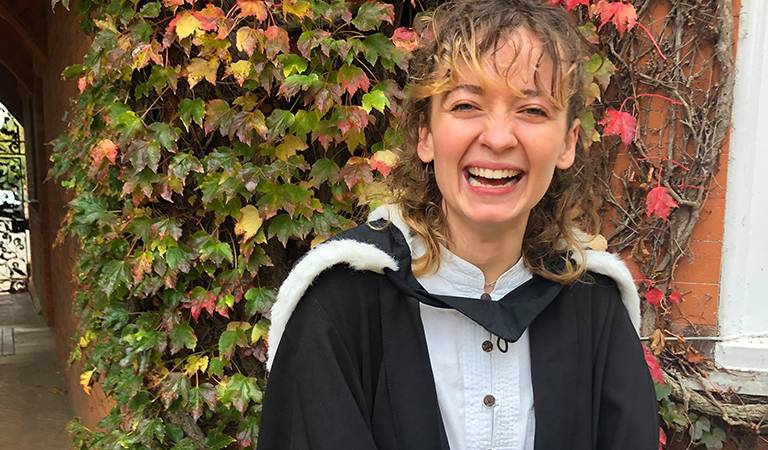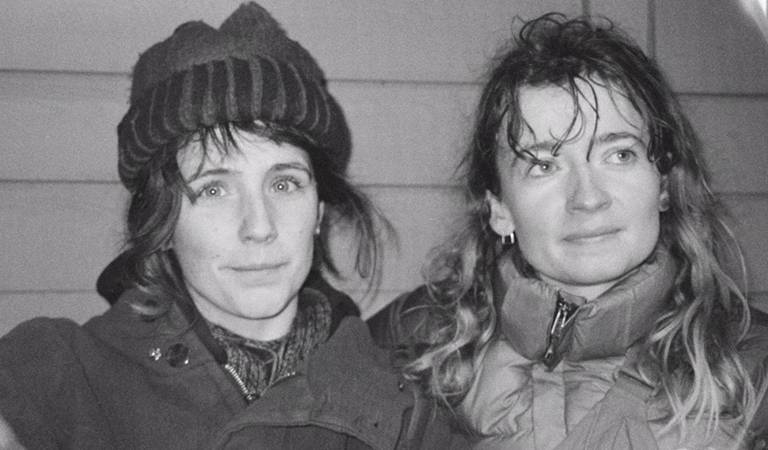Sophie Thorpe, MSc Environment, Politics and Society
Meet Sophie, a graduate from our MSc Environment, Politics and Society course and, currently, Civil Servant working on renewable energy policy.

4 April 2024
She tells us about how the dynamic course structure encouraged her to apply and her work organising the Geographies of Hope conference.
Why were you interested in studying an MSc in Environment, Politics and Society generally?
“At an admissions talk before beginning my undergraduate study of Geography, Professor Alex Jeffrey opened the talk by saying that he was drawn to Geography because of a sense of both wonder and concern about the world.
“For me it was exactly that, wonder and concern, which drew me to masters level study, as a way of making sense of biggest issues in the world, which so often fall at the intersection of environment, politics and society.
“When I had finished my undergraduate degree, I considered masters level study, but the fact that graduating coincided with the COVID-19 pandemic meant that any masters study at that stage would have been all online.
“I was keen for in-person teaching and building a sense of community with course mates, so knew that I wanted to postpone any masters plans until restrictions had eased.”
What was it that encouraged you to choose UCL?
“I was already living in London and UCL is in a great part of town, close to Regents Park.
“I also worked part-time teaching secondary school Geography during my masters year, so needed to be not too far from work.
“Additionally, my undergraduate dissertation supervisor Dr Eszter Kovacs was the course convenor for Environment, Politics and Society, and I had loved working with her on that project.”
What were the most interesting or engaging things you learned on the course?
“My favourite module was the 'Social Science Research Methods' course, led by Professor Alan Latham and Professor Russell Hitchings.
“Each week, we had a take-home task, encouraging us to try out the particular method we had been studying.
“I had previously found methods teaching pretty dry and disconnected from research or life, but found this course completely the opposite.
“It not only allowed me to reflect on my undergraduate research dissertation, but also play with new methods, including photo elicitation.
“I went on to use a combination of photo elicitation and focus group methods in my dissertation, which explored how young people talk about climate change.
“Prior to starting the masters, I had done Teach First, working for two years as a secondary school Geography teacher: therefore, I chose to draw my sample from students at the school I had taught at.”
"Dr Tatiana Thieme led fantastic lectures, including as part of the 'Environmental Knowledges' module, focussed on waste, repair and circularity.
“These sessions culminated with an exhibition made by and for our course mates: we were encouraged to bring in items that represented circularity.
“I brought a shirt made from leftover fabric scraps. Another course mate brought meringue biscuits made from aquafaba, the leftover water in tins of chickpeas, which went down a treat!
“On Tatiana's 'Precarious Urban Environments' course, we embarked on our own mini-ethnographic projects, and in the final week of the course presented posters to our course mates on our initial findings.
“The session ended with students all circulating the room to look at each other's posters and leaving comments and questions on post-it notes.”
“I also loved Dr Tom Western's module 'Migratory Activisms, Creative Citizenships'.
“He managed to cultivate a real sense of community among the group of students studying that module: the sessions were very student-led, with volunteers working together each week to make presentations and facilitate discussions.
“I loved the choice of creating a sound piece based on a protest as an alternative form of assessment: for this, I worked with another student to capture the work of the Right to Roam group protesting about the recently-revoked right to wild camp on parts of Dartmoor, and travelled to a protest on Dartmoor to make sound recordings for the submission.
“Finally, Dr Sam Randalls’ 'Politics of Climate Change' module was fantastic: the topic choices for each lecture were incredibly thought-provoking, and I found one-to-one office hours with Sam incredibly helpful in finalising my essay, which I focused on retrofitting housing as a solution to climate change.”
Can you tell us about any particularly memorable experiences from your time as a Masters student with us?

“I organised a day-long conference called 'Geographies of Hope' at UCL during my masters year, in collaboration with Francesca Rigg (pictured above, left) and Professor Emma Mawdsley.
“This brought together a range of fantastic speakers and attendees, including fifty sixth form students from the school I taught at.”
What do you hope to do in the future?
“I am currently working for the Civil Service in renewable energy policy.
“I am interested in government and policy work, and also potentially future PhD study and the possibility of continuing work around my masters dissertation topic.”
Would you recommend studying Environment, Politics and Society in the Department and why?
“Yes - very much so! I had a fantastic year of study, met some brilliant course mates and loved the modules on offer.
“I think that the quality of teaching in UCL's Geography department is fantastic.”
More Information
Interested in following in Sophie’s footsteps? Find out more about our MSc Environment, Politics and Society course and see out other degrees in the Study section.
 Close
Close

